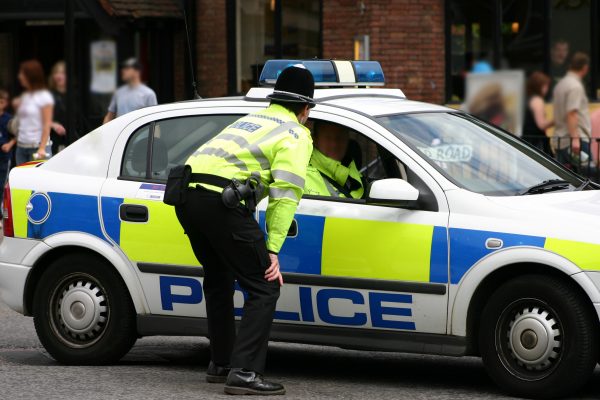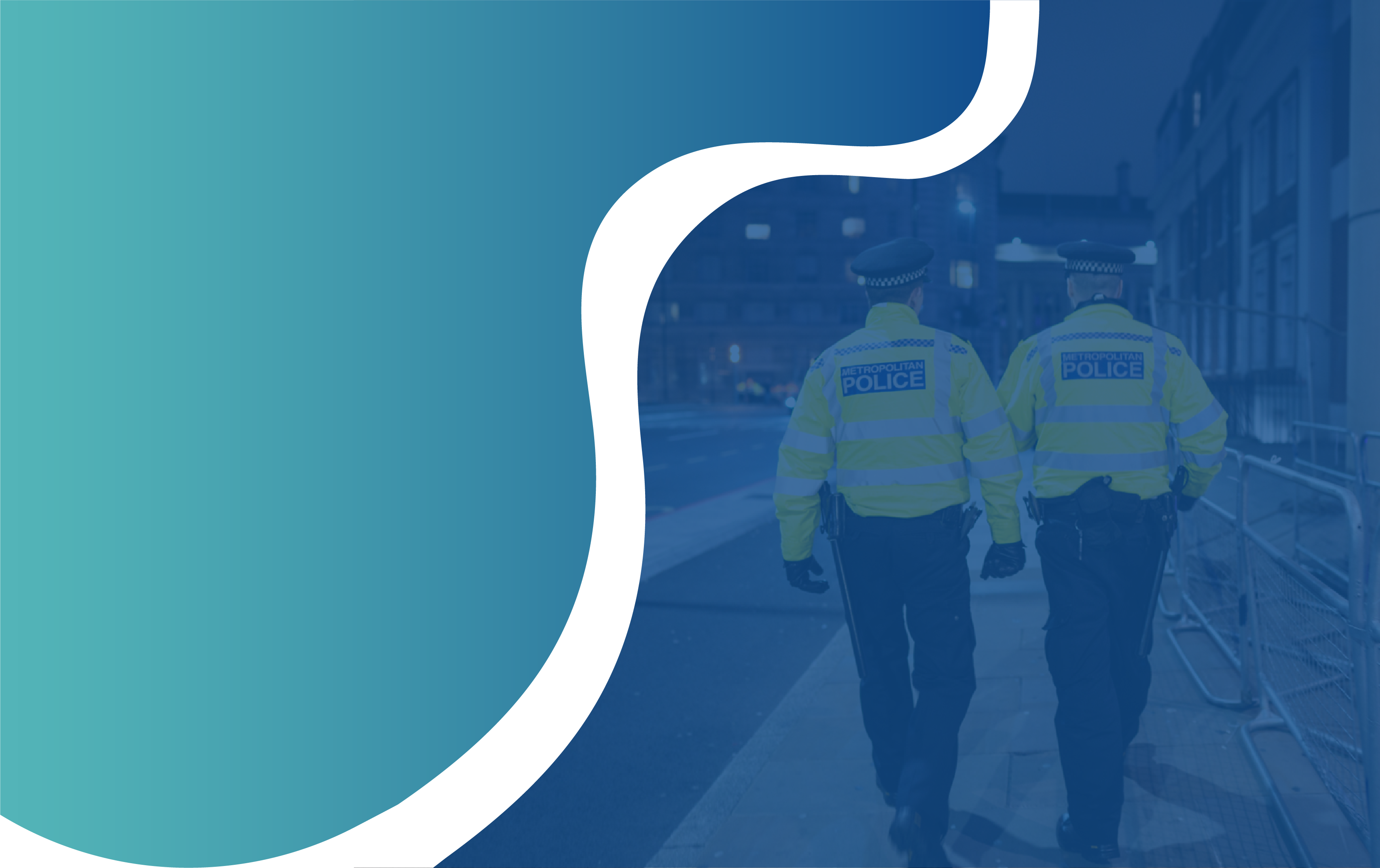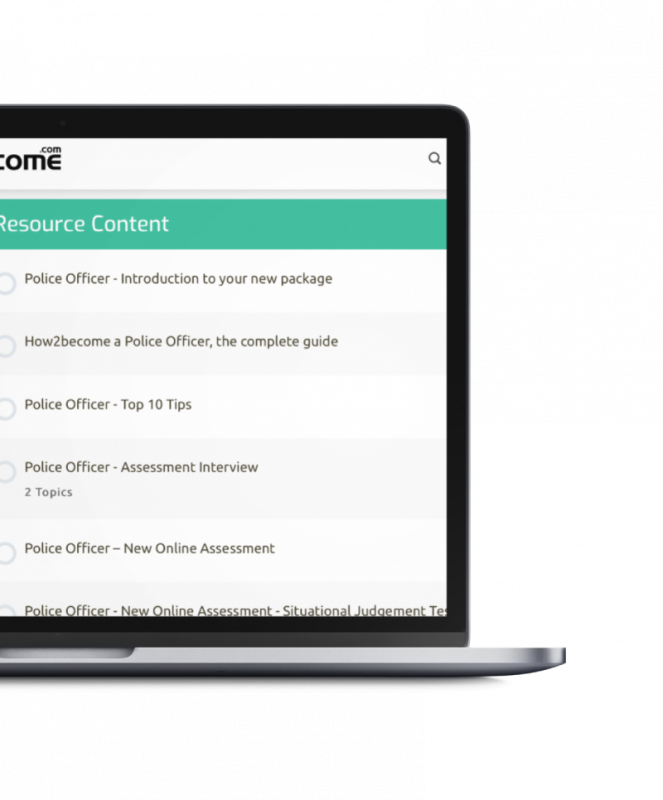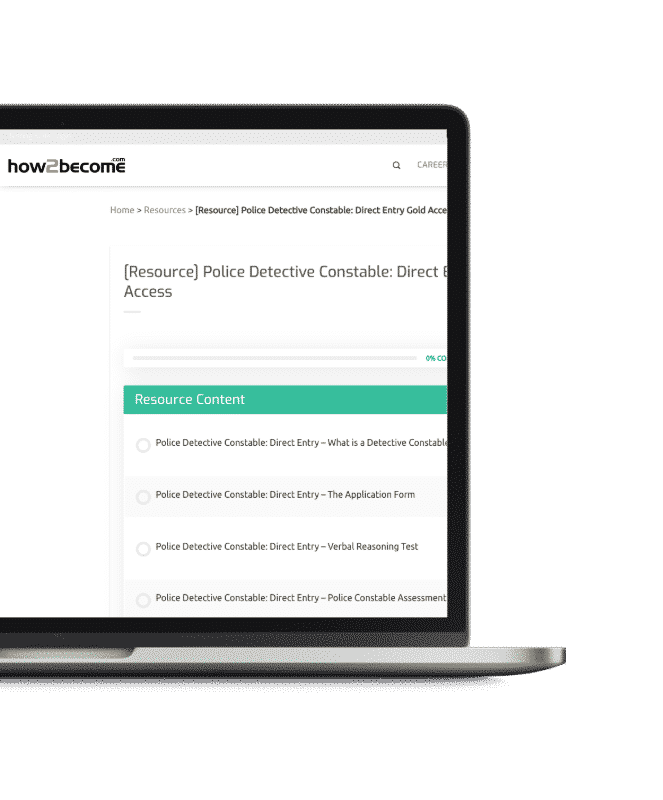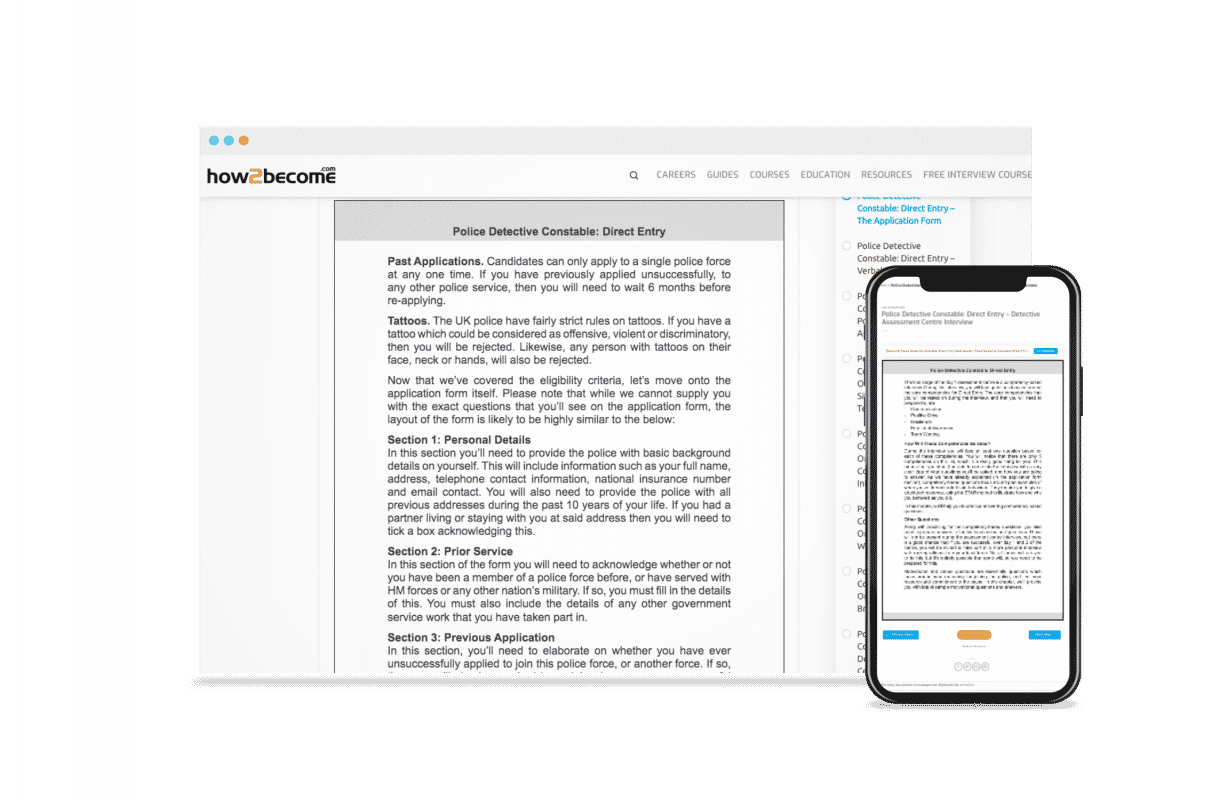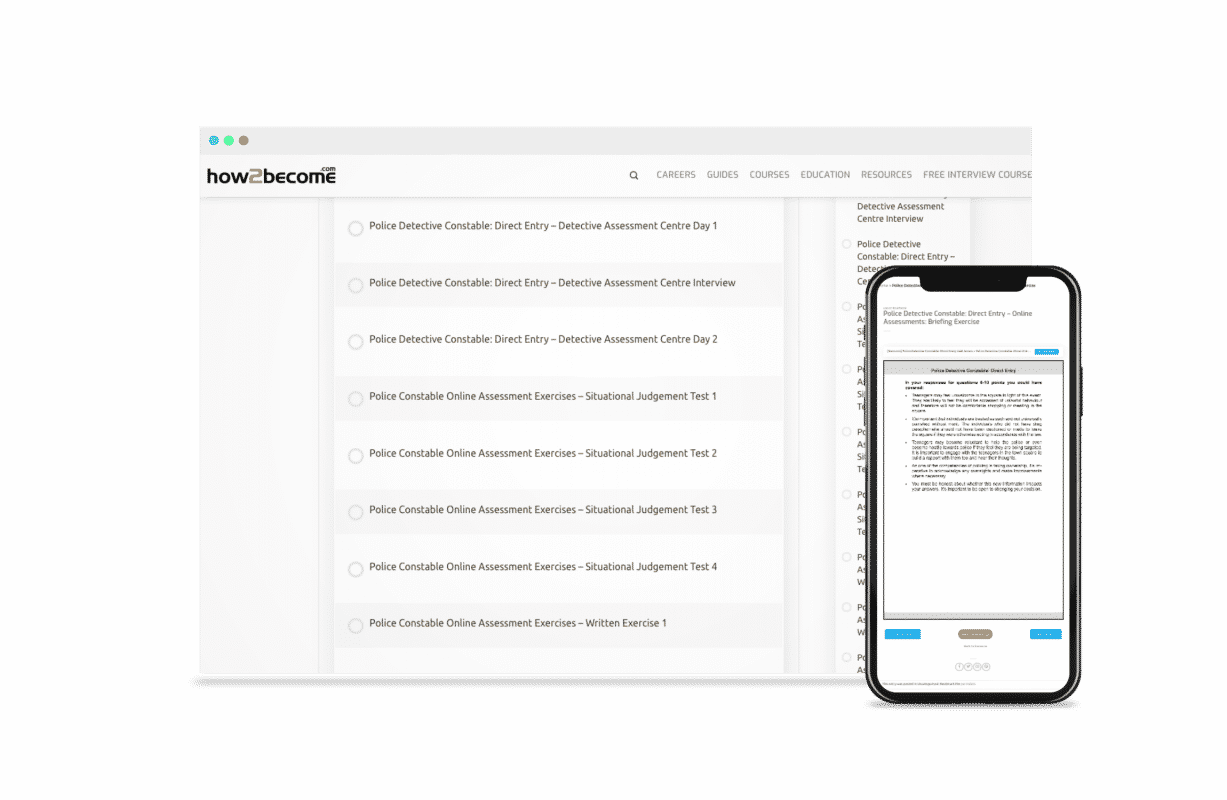
How to Become a Police Detective Constable in 2026
The complete guide to unlocking and passing the direct entry detective constable recruitment process. Become a Detective Constable with How2become.
4.9/5 Rating | 1,000+ Reviews
![]()
Training That Works
Discover a masterclass of police recruitment knowledge and insider secrets from How2Become
Unlock Your Potential
Whether you’re just starting out or you’re reapplying, you will get access to on-demand training that will catapult your career
Powerful Resources
Get instant access to the on-demand police recruitment training guides, interactive online tests, and video modules – suitable for all England and Wales Police Forces
Become a Police DETECTIVE CONSTABLE
Our POWERFUL guide is guaranteed to help you become a police detective constable via the direct entry route. It contains sample police application form responses that you can use to form your own unique winning answers, insider tips on passing the National Police Constable Assessment Centre, sample police interview questions, and successful responses for every stage of the process.
Let’s start off by telling you what the UK selection process involves and how we can help you join the police!
We have collated a mass of insider information on how to successfully pass the selection process and it is all available on this page.
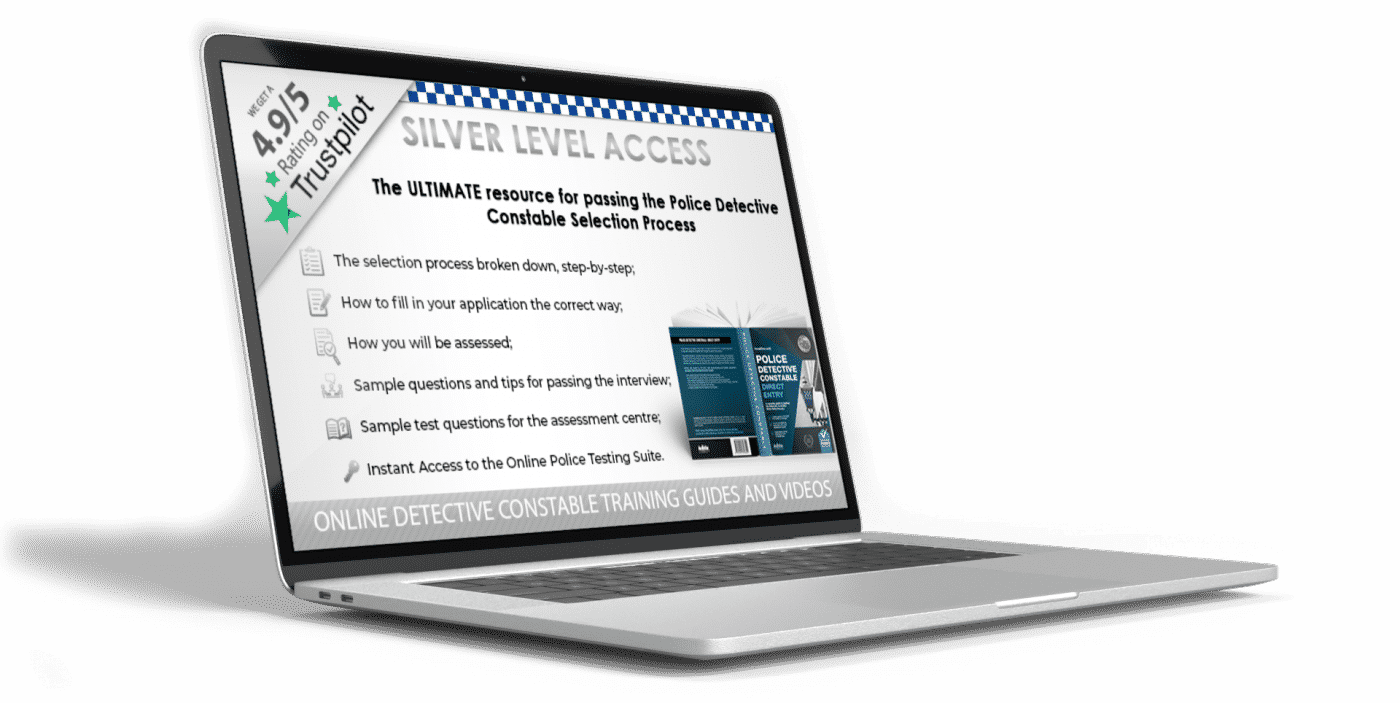

The Police Detective Constable Selection Process
The selection process to join the police through the direct entry programme will normally consist of the following elements:
Application Form
PC Online Assessment Process
DC Assessment Centre & Interview
Final Stages
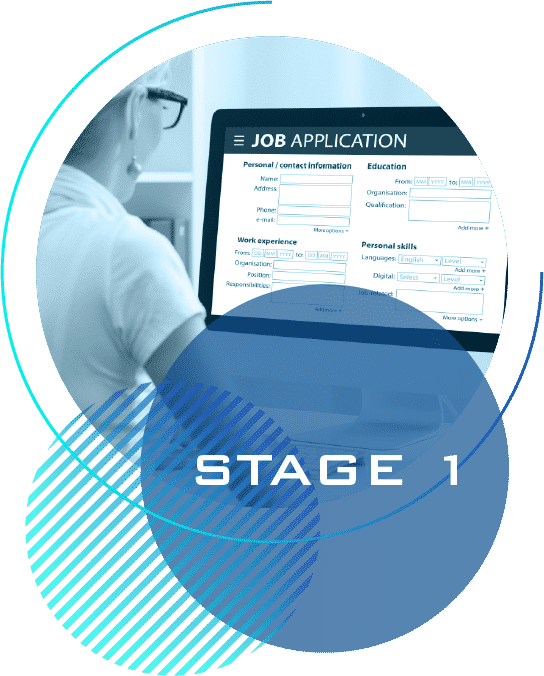
Stage 1 – competency-based application form
The first stage of the application is to fill in an online eligibility form, and an application form. The application form will include sections such as:
- Personal details
- Prior service
- Previous application/s
- Competency-based questions
Stage 2 – National ONLINE Assessment PROCESS
Once you have successfully passed the application form and verbal reasoning test you will be invited to take part in the police constable online assessment process. During which you will be required to undertake the following online assessments:
Situational judgement test (or SJT)
Competency-based video interview
Briefing exercise
Written exercise
Throughout this process you will be assessed against the competencies and values of policing as a police constable.


Stage 3 – DC ASSESSMENT CENTRE
After completing and passing the Police Constable online assessment process, you will then be invited to attend the Detective Constable assessment centre.
This consists of an in-tray exercise, a briefing exercise, and an interview.
You will then be invited to attend a medical and fitness test to ensure that you meet the minimum eligibility requirements for becoming a police detective constable.
Stage 4 – FINAL STAGES
If you are successful in applying for Direct Entry, you’ll start out as a trainee detective constable, under a two-year probationary period. The training will be suitably intense, with visits to operational police facilities and working within Criminal Investigation Units. During your two-year probationary period, you’ll need to complete the National Investigators’ Exam, and a detective training course. Once the two-year period is up, you will be granted the rank of Detective Constable, and assigned the rank of Detective Constable.
Whilst working as a trainee, you’ll be assigned cases such as burglary, hate crime, sexual assault and fraud. Initially you’ll start with smaller crimes, before working your way up to serious issues.

Direct Entry as Detective Constable: Commonly Asked Questions
Yes, this option is now offered by many of the UK forces in England and Wales. Although the name of the scheme varies from force to force as does some of the selection process. This is a viable option for some as long as you pass the eligibility criteria.
To qualify for the scheme in the UK, you will need a degree at level 2:2 as a minimum. If you do not have this, you could decide to take a course which will give you a degree to qualify, or apply via the police constable route and serve your two-year probation period as a police constable and then apply directly from there
The salary for a training detective constable in the UK will vary from forces. As an example; in the Metropolitan Police, you will start on a salary of £30,000 plus this incudes London weighting and other allowances. For the rest of England and Wales, you can expect a starting salary of around £24,000 as training Detective Constable.
This would take at least 2 years as you would have to complete your training and the probationary period as a Detective Constable. Once your 2 years are completed you can apply for any available Detective Sergeant positions.
Once you have been offered the position you will receive a date to start your training, the first part of the training will take a total of 12 weeks and will include both practical and classroom-based tuition. The remainder of the course over the two years will be a mixture of on-the-job training and university based training.
Police Detective Constable Direct Entry: An Introduction
A Detective Constable is a high-ranking officer in the police force. The role of a Detective Constable is to participate in difficult and complex criminal investigations, interview victims of crimes (and suspects), and play a leading management role within the police.
When working as a Detective Constable, your responsibilities will include:
- Directing and participating in criminal investigations;
- Assessing a range of information and data, to ensure accurate decisions are made;
- Developing strategies for managing investigations, and evaluating existing strategies to determine how they could be improved;
- Using the latest technology, to assist ongoing investigations;
- Making cost-effective decisions, with the police budget in mind;
- Ensuring that interviews and interrogations are carried out with the utmost professionalism.
Naturally, this is all pretty difficult! The police won’t expect candidates from the Direct Entry course to just walk into the job and start solving crimes. You’ll be given extensive training to prepare you for all this, and to make sure that you are ready for the challenges ahead. Detective Constables are expected to operate under what are known as ‘building blocks’. These building blocks essentially underline the way in which you will work as a Detective Constable, and they will be especially useful when you sit the assessment centre. Think of these as a framework or structure for how you would tackle tasks when working in the police:
This should be the immediate priority for any person who is sent to a crime scene. First aid should be provided to casualties in need, and an ambulance should also be requested if necessary.
Preserving life should be the mandatory first protocol, even if it risks compromising the crime scene.
Your next priority should be in preserving the crime scene. You need to look at the crime scene as an area, and secure all routes to and from the scene, by placing tape over the entrances, assigning officers to guard entrances and deny access from civilians. You also need to ensure that steps are taken to secure physical evidence, without disrupting or damaging this evidence. Following the above, it’s imperative that you take steps to make sure the evidence is handled carefully. This could be in the form of taking witness statements, or even seizing crime scene items.
Next, you need to make identifying victims your priority. By doing this early, you stand a better chance of identifying suspects, and in doing so solving the case.
Finally, you need to engage in identifying and arresting suspects. This is extremely important, as suspects could pose a risk to others, or destroy essential evidence before it can be seized by police.
Police Detective Constable Competencies
As per the normal police standards, it’s extremely important that you have a good knowledge of the detective constable competencies. These are the core values/behaviours that you will be assessed against during the selection process.
We’ve listed these below:
- Emotional Awareness
- Positive Drive
- Resilience
- Team-working
- Communication
- Professional Approach
- Investigative Mind

PASS THE POLICE DETECTIVE CONSTABLE RECRUITMENT PROCESS

We guarantee that our How To Become a Police Detective Constable online resources will teach you how to navigate the different elements of the selection process. The package contains 140+ pages of police recruitment insider tips, practice tests, and proven strategies which will guide you through each element of selection, including the application form, the assessment centre, the interviews and the fitness test.
Start Preparing Now 👉Detective Constable Direct Entry Assessment Day
Okay, so you’ve cleared the first two hurdles, but now it’s time for the big one – the Direct Entry Assessment Day. During this super tough assessment day, you will need to pass three exercises in total:
- An in-tray exercise;
- A briefing exercise;
- An interview.
All of the exercises have been created with the Detective Constable role in mind. Both the in-tray and the briefing will place you in the role of a qualified detective constable. Following the completion of each exercise, you will be required to fill in a ‘self-reflection’ form. This is essentially a form which gives you the opportunity to note down what you think you did well during the exercise, and what you think you could have done better. The self-reflection forms are an important part of the assessment, and the police will look at these when assessing your overall performance.
The competencies will play a crucial role in how well you score at the assessment centre. In every single exercise, you should be aiming to demonstrate that you have these competencies and understand why they are important to the role. Before you attend the assessment centre, make sure you sit down and study the competencies in careful detail. If you cannot show an in-depth understanding of the competencies then you will not pass the assessment centre and progress to the next stage.
Below we’ve broken down the briefing exercise and the in-tray exercise for you.
An in-tray exercise is a paper-based exercise which simulates an office environment.
The goal of the exercise is to replicate a normal working day for the job which you are applying for. Therefore, in-tray is an excellent way to measure a candidate’s ability and see whether they work in a way which is conducive to the job and business as a whole. In a sense, the in-tray exercise is like a role play exercise. You are asked to assume a role, then, under the specification given, you are expected to complete the tasks presented to you. Generally speaking, this involves being given a collection of tasks to complete: your job is not only to complete these tasks, but to also prioritise them in an order which means you’re most likely to complete them all in time. Different pieces of work will have varying deadlines.
Likewise, you might find a piece of work later in your assessment which has a tighter deadline. Therefore, it might be the case that this newer piece of work needs to take precedence over everything else, which can be put to one side for the time being. The Detective Constable assessment centre takes a slightly different approach than you would normally expect. Instead of prioritising the issues in order, you will need to write a report, based on what you’ve read – summarising your main priorities, how you would order the issues, and what actions you will take based on this.
Following your in-tray assessment, you will be asked to take what is known as a briefing exercise.
The briefing exercise lasts for around 1 hour in total. You’ll likely be given 30 minutes before the exercise to prepare, and 30 minutes to complete the exercise itself. During the exercise, you will be asked to give a verbal presentation on the in-tray exercise, to an inspector. Essentially, you will be physically describing all of the elements that you listed in your in-tray report. The presentation normally lasts for 30 minutes overall, with a period of 15 minutes dedicated to presenting and 15 minutes where you will be asked questions by your assessors (your “inspector”) based on what you’ve said.
These questions will be focused around the topics that you’ve raised, and you’ll need to provide good quality answers to all of them in order to pass. You will be allowed to bring your report into the briefing with you, but you’ll be judged based on how well you can present your ideas, so it’s essential that you can make the most of the planning stage. As we’ve mentioned, you will be given a period of 30 minutes, prior to the exercise, to plan how you will present your ideas to the inspector.
Detective Constable Assessment Centre: The Interview
During the Detective Constable Assessment Centre interview, you will face questions focused around the competencies and values of policing. You will face at least one question based on each of the competencies.
You need to take into account all of the micro factors that make up these behaviours. For example, ‘team working’ is not just about working as a member of a team. It’s about communicating with your team, being a supportive person, asking for help, showing understanding and consideration for the feelings of others, and being a leader. So, when you give a response showing that you are a good team worker, take care to show these qualities.
When the assessors question you, they won’t always make it so easy. While it’s true that some questions will be pretty black and white, for example, ‘give us an example of when you have worked as part of a team to resolve an issue’, they may also try and make it a bit more difficult. For some questions, you’ll need to take a moment and think about what competency would apply in this scenario. For example, ‘give us an example of a time when you have overcome adversity in the workplace.’ You’ll notice that the wording of this question doesn’t actually incorporate any of the competencies. When you get a question like this, consider the main issue. In this case, the words ‘overcome adversity’ would be the main topic of the question – which can be linked with resilience.

Pass the Police Detective Constable Selection Process. First Time.
Crafted for everyone, no matter your skill level or background, this guide was made to help you achieve one goal: become a police detective constable.
WHAT WILL YOU LEARN?
Scoring Criteria
Essential information about how you will be assessed during every stage of the selection process.
APPLICATION FORM SAMPLE ANSWERS
Lots of up-to-date sample application form questions, responses and tips on how to pass this initial stage.
PRACTICE ONLINE ASSESSMENT PROCESS TESTS
Step-by-step information on how to pass the online assessment processes.
INTERVIEW QUESTIONS & ANSWERS
Sample answers to each of the competency-based interview questions.
INSIDER SECRETS
Insider tips on how to answer the interview questions and advice on how you will be scored.
SCORE-BOOSTING STRATEGIES
Get ahead of the competition with unique and proven strategies 16 years in the making.
Customer Success Stories
Having helped 1,000s of aspiring police detective constables for over 16 years, it is no wonder our customers love us…

Great books that gave me a good head start at the police assessment centre. Thank you. – Chidi O. – TrustPilot

Very good product value loads of valuable information… – Jamie W. – TrustPilot

Richard and his team have been extremely helpful so far in the Police Officer process, I can’t recommend them enough. – Sara A. – TrustPilot

The books and videos were fantastic… interview last week and passed… – Hilary. F. – TrustPilot

This is the 2nd time I have used How2Become and the 2nd time I have got the job…If your looking for that slight edge over your competitors then look no further. – Chris H. – TrustPilot

WHAT’S INCLUDED IN YOUR CAREER PACK?
Complete guidance to ensure you pass the ENTIRE police recruitment process
Insider advice on how to complete the application form, including sample questions and answers
Previously successful application form responses that you can use to develop your own winning application!
Discover exactly how you are assessed throughout the entire selection process (hint: understanding this will allow you to know exactly how the assessors want you to act at every stage)
A complete breakdown of the new Online Assessment Process and how you MUST prepare if you wish to succeed
A detailed breakdown of the online SJT (known as Stage 1/Exercise 1) including practice questions and answers so you can fully prepare
Sample police competency and values-based interview questions and guidance on how to answer each one of them for Stage 2/Exercise 2 of the Online Assessment Process
What are competency-based questions, how to structure your responses, what keywords you MUST use, and how to impress when answering each of the 4 questions
A full breakdown of the competencies and cutting out the filler so you can memorise only what you NEED to know, making preparation a lot easier!
Practice questions and answers for the written exercise (Stage 3a/Exercise 3). Practice the same skills you’ll be tested on so you enter your test fully prepared

The Briefing Exercise broken down – how this police test is NOT a presentation like you’d expect and how there really is only ONE WAY to get this right
Practice questions and answers for the DC interview – suitable for all England and Wales police forces
The importance of ensuring you meet the minimum eligibility requirements (and understanding the role of a police detective constable
How to get fit and be able to pass the detective constable fitness test and medical test
Suitable for ALL England and Wales police forces
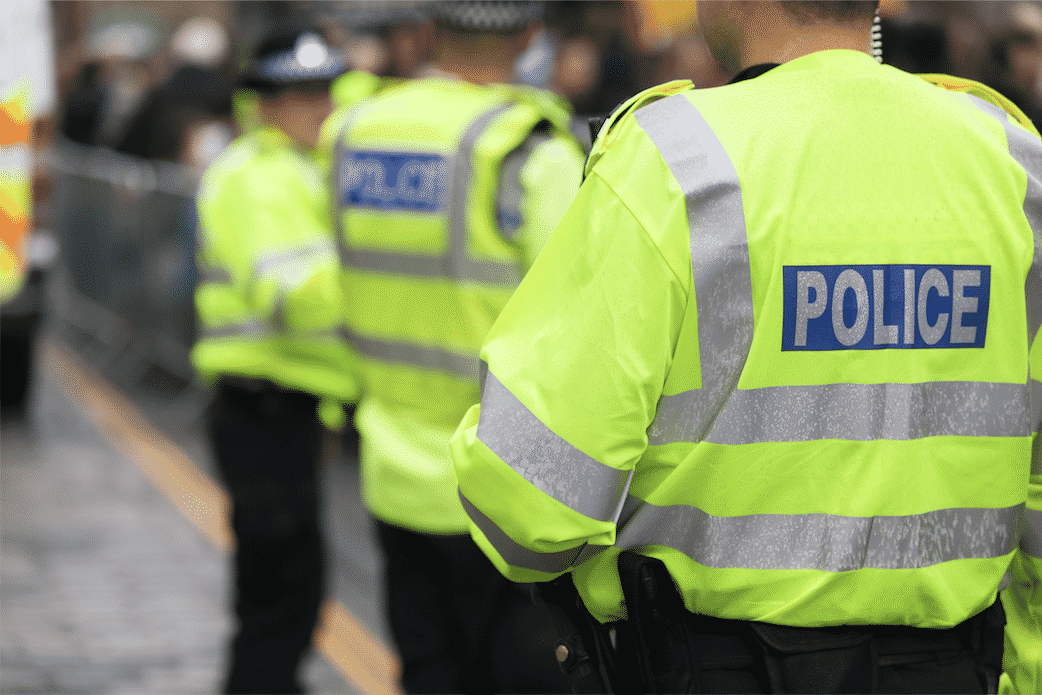
PLUS…BONUSES!

BONUS #1
150-Page Interview Skills Insider’s Guide
FOR A LIMITED PERIOD ONLY we are able to give you our powerful 150+ page ‘Interview Skills’ online guide free of charge. It is the perfect guide to help you prepare for the tough police final interview!

- All of the most common (and not so common) interview questions you are likely to face broken down.
- Full and detailed answers to every question – ensure you always have the perfect answer!
- How to use the STAR method to come up with your own winning answers that match the experience, values, and skills the interview assessor is looking for.
- Created by interview panel experts and packed full of insider advice.
Important: This insider’s guide cannot be purchased individually anywhere else and is exclusively available as a limited-time bonus!
Worth £9.99, Yours FREE
BONUS #2
How to Get Police Fit Insider’s Guide
A concise online guide to show you how you can get “police fit” and see results quickly to ensure you pass the police fitness test (even without having a gym membership!).

- Crafted with the fitness benchmark levels required of a police detective in mind, this guide provides an insider insight to police fitness regimes you can follow.
- Your very own “police fit” workout regime formed by former emergency service staff.
- No nonsense guide on how to score highly at the multi-stage fitness test.
- Full technique diagrams, workout timetables and regime templates you can implement right away!
Important: This insider’s guide cannot be purchased individually anywhere else and is an available exclusively as a bonus with this resource.
Worth £9.99, Yours FREE
BONUS #3
PLUS…30-Day Free Subscription Trial To The Online Police Assessment Centre Testing Platform!
As well as lifetime access to the police career resource, this product also includes a 30-day free trial to our Online Police Assessment Centre Testing Platform (usually £9.99+vat per month).

- 100s of questions and answers on each element of the PC assessment centre to help boost your scores!
- Practice all of the test questions under timed conditions using our online testing suite.
- Instant online access. Compatible on mobiles, tablets and computers.
- Interactive tests, with complete score tracking and detailed answers.
Important: This powerful free trial costs £9.99 + vat every month for everyone else! You will get unrestricted access to all of the quick-win strategies and tip tutorials to give you the advantage right away.
Worth £9.99, Yours FREE for 30-days*
*We want you to know: This is a subscription service that is charged at just £5.95 + vat per month after the 30-day trial expires. No minimum term. If you cancel before the 30-day trial ends, you will not be charged. Please see our terms for full details.

THE TOPICS COVERED IN THIS ONLINE RESOURCE INCLUDE:
THE DIRECT ENTRY COMPETENCIES
- Why the competencies matter, and why you should learn them;
- Specific behaviours which link in with each particular competency;
- Sample police interview scoring criteria.
HOW TO ACE THE ASSESSMENT CENTRES
- An extensive overview of how to pass the types of test you’ll encounter;
- How to get your practice in early, to beat the competition;
- Things to avoid and things to do in the run up to assessment;
- Top tips from experienced industry experts!
THE DIRECT ENTRY INTERVIEW
- Essential tips on how to ace the interview;
- How to use the core competencies to impress the assessors;
- Brilliant examples, upon which you can base your own responses;
- How to use your strengths to your advantage.
Features
You don’t just get advice on what to do. We will show you exactly how to pass the police detective constable recruitment process.
Proven Guidance
Over 16 years’ of experience packed into on-demand insider recruitment guides that have helped 1,000s.
Unique Training
Includes unique police detective constable recruitment training content built from the ground up and not found anywhere else.

Actionable Content
We don’t just share what you need to do, but also HOW you should do it with tips and strategies you can implement today!
Swipeable Templates
These templates are worth the value of the resource themselves – we give you the exact foundations you can use to build your application and master assessment stages!
Your 140-Page Guide To Success.
Our guide in a compact, accessible, online format to hold your hand throughout the entire police detective constable selection process.
Created By Experts. Made For You.
With over 16 years of history behind us, we are the leaders in police recruitment advice. So whether you want to understand the scoring criteria, learn what must go on your application form, recognise what not to say at the interview, or practice and pass the online tests, you can access it all at your finger tips, today.
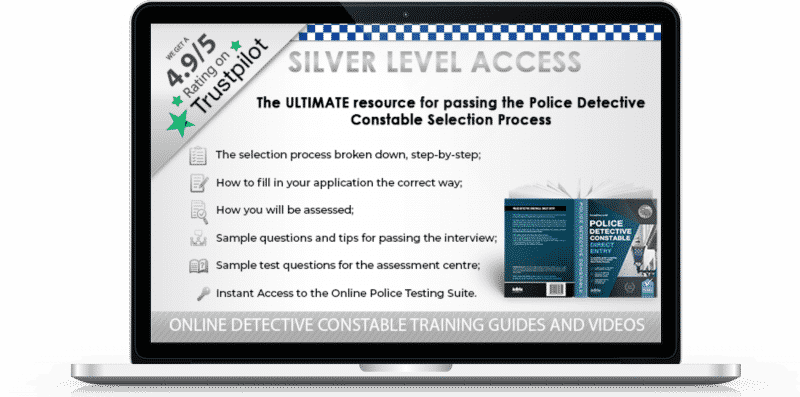
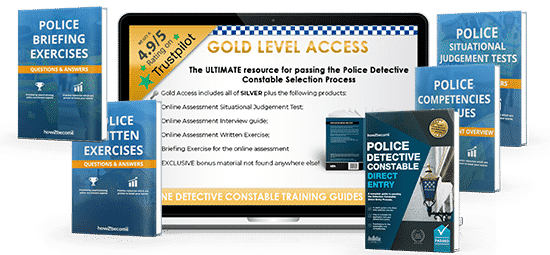
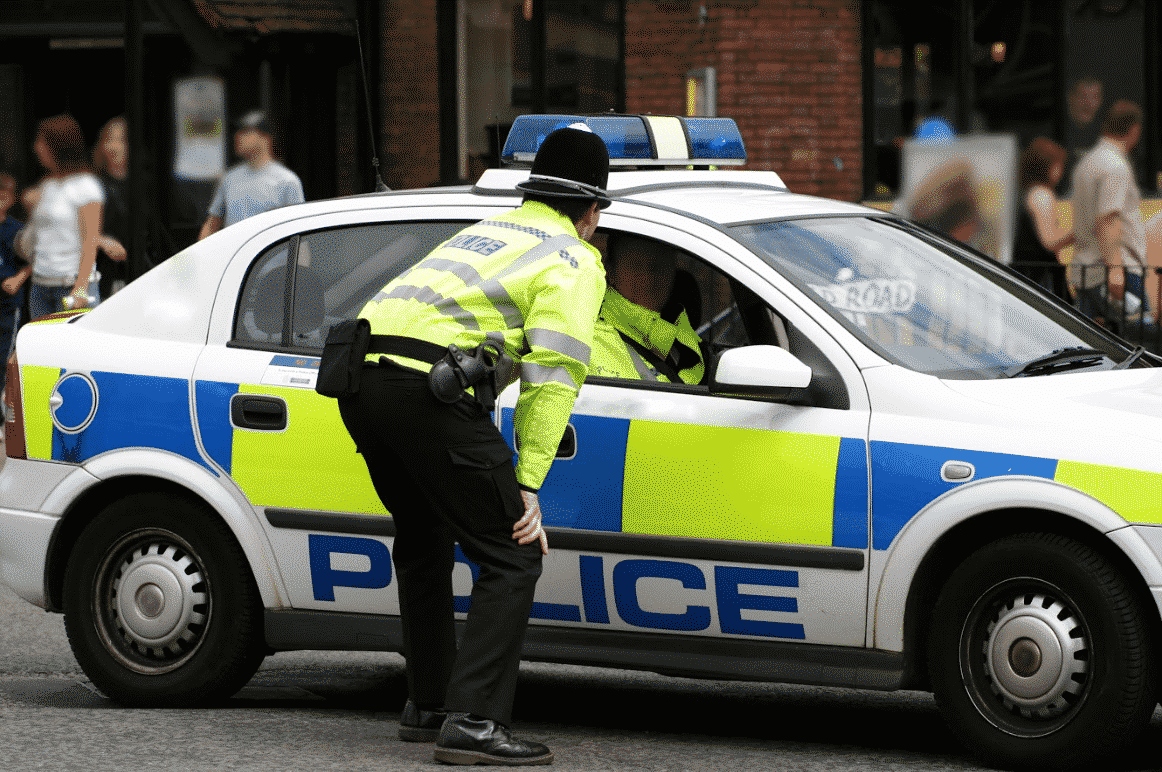
FAQ
Frequently asked questions
Simply put, this training works and is proven to help people like you to successfully join the police. As a lifetime access police member, you will not only benefit from our flagship 140-page ‘How to Become a Police Detective Constable’ guide (which has sold 1,000s of copies) but you’ll also get access to a dynamic portal of content that we update frequently with all the very latest information, practice material, and strategies that are helping people across England and Wales to successfully join the police. With 1,000s of customers frequently thanking us for the career success we have helped them gain, and 16 years’ experience in providing recruitment and assessment centre training, you can rest assured knowing you are getting the best police training material on the market.
This resource is designed to help anyone looking to become a police detective constable and conquer the gruelling selection process.
It is ideal for those just staring out at the application stage, who want an “over-the-shoulder” guide to passing each stage of the process.
If you have already begun the selection process, then you’ll be able to pick up this guide from the exact stage you are at and follow the step-by-step guidance to passing the Online Assessment Process, DC assessment centre, fitness test, and more with winning confidence.
Whatever stage of the process you are at, you can be confident you’ll have all the strategies and tools you need to succeed.
Yes! With the ‘How to Become a Police Detective Constable’ guide you will be able to access training that has been helping students successfully become police detectives for over a decade.
At How2Become.com we like to do things a little differently. Instead of just giving you access to guides which explain how the selection process works, and what you need to do to pass, we teach you HOW to do it also. For example, we don’t just provide you with sample interview questions, we provide winning sample responses and step by step guidance on how to create your own successful answers. Whether you are thinking about applying, or you are half way through the police selection process, this guide ‘hold your hand’ step-by-step. Here is a full list of everything you will get within this resource.
You will get unlimited access to all of the content contained within this resource with no time restrictions! We understand that applying to the police can be a long and stressful experience, that is why we want to take away one less worry – you will get access whenever you need, whether its just for a week, or for a year, you will have full access to the ‘How to Become a Police Detective Constable’ guide whenever you need it. You will also access to all future updates we make to this guide, ensuring you are getting the latest guidance.
When we launched How2Become.com we wanted to ensure our content would help as many people as possible no matter where they are, and we are achieving just that! We sell our resources to every country in the world, with 1000s of customers in the USA, UK, India, Australia, Africa and more! All of our content is either written or spoken in English, with the content designed to be as universal as possible unless otherwise stated. Our ‘How to Become a Police Detective Constable’ guide is designed specifically for all England and Wales police forces. The British Transport Police, Ministry of Defence, Scottish Police, and PSNI have different selection processes and we have guides specifically for these. If you can’t see a guide you need in our huge catalogue, then just let us know and we will help if we can!
Whichever option you choose, you can be confident you are getting the latest and highest quality training to become a police detective. All packages contain our flagship 140-page police guide and the bonuses listed on this page.
The Gold package contains everything that’s included in the silver package plus additional training and practice resources to help you pass the challenging national PC online assessment process.
As soon as your order is complete you will be able to access all of the guides, training resources, and view the on-demand video via your How2Become account! You can use any smart phone, PC, Mac, or tablet to access your materials.
Yes, absolutely! We get 100s of testimonials and comments each month from those that have used our training thanking us for the help it has given them.
Having been creating recruitment guides for the last 16 years, we know how often selection processes change. In addition, with over 40 police forces across England and Wales, they all make adjustments to their recruitment criteria. That is why we keep close ties to those in the know and we regularly update our content. You will get the latest and best strategies to enable you to become a police detective constable.
WHY BUY WITH HOW2BECOME?
CREATED BY THE EXPERTS
PROVEN TRAINING
EXCLUSIVE FREE BONUSES
Firstly, these guides are created by us and our team of experts – we have all the answers to your questions and will help you succeed (like we’ve been doing for the last 16 years), we update our material frequently and you can contact us at any time with any questions you have.
Secondly, we provide exclusive bonuses with all our products that you won’t find anywhere else. These bonuses include free guides, powerful online testing suites and more!
Finally, our guides and training just work. Take a look at our TrustPilot page where you will see our rating of 4.9/5. There, our customers share their positive buying experiences and more importantly the time-saving success our resources have given them.

Learn how to join the UK POLICE SERVICE
We’ve helped 1,000s of aspiring applicants in their journeys to becoming serving police detectives across the UK. Trust the UK’s #1 careers and education specialists to help you secure your role.
Get instant access »“Great resource and excellent information for interview preparation.” Sreenivasa P.
RELATED PRODUCTS

Police Interview Guide
Want a dedicated Police Interview insider’s workbook? Use this workbook’s templates to craft your own successful answers for both the in-force/final interview and the Online Assessment Process police interview.

Police Tests Guide
Worried about the intensive police tests? This manual provides 100s of practice questions and fully worked solutions, all verified by our panel of police assessment experts. Get the assessment centre edge today.

Police Recruitment Webinar
If you want the latest insider information delivered live by a former MET Police assessment trainer, then you need to attend one of our exclusive live webinars. Get all of your police recruitment questions answered.
The Metropolitan Police is the largest police force in the UK, and one of the most respected law enforcement organisations in the world. If you are familiar with the Met, then you’ll be aware that they operate under a highly organised and structured rank system. One of these ranks, is Detective Constable. In this blog, we’ll give you some information on how you can apply to become a Detective Constable, through the Detective Constable Direct Entry programme.
What is Detective Constable Direct Entry?
Direct Entry is pretty much exactly what it says on the tin. It’s a way of directly entering the police as a detective constable. Usually, you would need to gain a few years of experience with the police in order to progress up to this rank. However, now the police are offering talented candidates the chance to enter the force at this rank, and then progress from there.
If you are successful in applying for Direct Entry, you’ll start out as a trainee detective constable, under a two-year probationary period. The training will be suitably intense, with visits to operational police facilities and working within Criminal Investigation units. During your two-year period, you’ll need to complete the National Investigators Exam, and a Detective training course. Once the two-year period is up, you will be granted the rank of Detective Constable, and assigned the rank of Detective Constable.
Whilst working as a trainee, you’ll be assigned cases such as burglary, hate crime, sexual assault and fraud. Initially you’ll start with smaller crimes, before working your way up to serious issues.
Now, let’s look at the application process a little more closely.
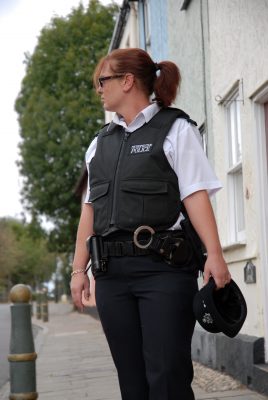
Stage 1: Application Form
The first stage of the process is to fill in an online application form. In this form, you’ll need to fill in a series of personal questions, as well filling in eligibility style questions – based on factors such as your age, past work history, education and any previous convictions. This is pretty simple to fill out. At the end of the form you will be asked 4 competency based questions – and you’ll be given 200 words to answer each. When answering these questions, you need to be concise and focused. Make sure you clearly explain the situation, using the STAR method, and explain how your actions resolved it.
Stage 2: Online Verbal Reasoning Test
The second stage is for candidates to complete an online verbal reasoning assessment. In this assessment, you will need to read a passage, which will be followed by a number of statements. Your job is to decide whether each statement is True, False or Impossible To Say based on the information given in the passage. When answering the questions, you must focus ONLY on what is given in the passage. You cannot use real-world information when answering. There will be several passages in this assessment, and you will need to pass in order to move onto the next stage.

Stage 3: Regular Police Constable Assessment Centre
The third stage in the process is the Regular Police Assessment Centre. All Detective Constables have to go through this, as it’s just another part of the intense filtering process for Direct Entry. Remember, the police are looking for the elite candidates for Direct Entry. The regular police constable assessment centre consists of the following:
- A verbal reasoning test
- A numerical reasoning test
- Written exercises
- Role-play
- A competency-based interview
The regular police assessment uses the normal police constable core competencies, and not the Detective Constable Direct Entry competencies, so you’ll need to revise the former carefully before the centre!

Stage 4: Detective Constable Direct Entry Assessment Centre – Day 1
The next stage is the Detective Constable Assessment Centre. Here you’ll be seriously tested, and will need to pass a total of three assessments. The assessments are as follows:
In-Tray Exercise
The In-Tray Exercise will test your ability to prioritise information. You’ll be placed in the position of a new Detective Constable, and will be given a series of texts, emails and written reports regarding police-related matters. In the middle of the exercise, you’ll be given an extra set of information, which you will need to merge into your current report. At the end of the exercise, you will need to prioritise all of the issues that you’ve encountered – in the form of a written letter to your Chief Inspector.
Briefing Exercise
Following the In-Tray, you’ll need to complete a Briefing Exercise. The Briefing exercise lasts for around 1 hour in total. You’ll likely be given 30 minutes before the exercise to prepare, and 30 minutes to complete the exercise itself. During the exercise, you will be asked to give a verbal presentation on the In-Tray exercise, to an inspector. Essentially, you will be physically describing all of the elements that you listed in your In-Tray report.
The presentation normally lasts for 30 minutes overall, with a period of 15 minutes dedicated to presenting and 15-minutes where you will be asked questions by your assessors (your “inspector”) based on what you’ve said. These questions will be focused around the topics that you’ve raised, and you’ll need to provide good quality answers to all of them in order to pass. You will be allowed to bring your report into the Briefing with you, but you’ll be judged based on how well you can present your ideas, so it’s essential that you can make the most of the planning stage.
Competency-Based Interview
Finally, you’ll finish Day 1 of the assessment centre with a competency-based interview. In this interview, you should expect to answer questions focused around the Detective Constable core competencies. This interview will be a little less rigid than the regular Police Constable interview, and you will have the opportunity to discuss things with the interviewers.
Stage 5: Detective Constable Direct Entry Assessment Centre – Day 2
Finally, you’ll be required to attend a day 2 assessment centre, where you will be required to take the bleep test, and be tested on medical elements such as eyesight, body fat, etc. Once you’ve passed this stage, the police will conduct further vetting – and after that you will join the Detective Constable Direct Entry course. Congratulations!
